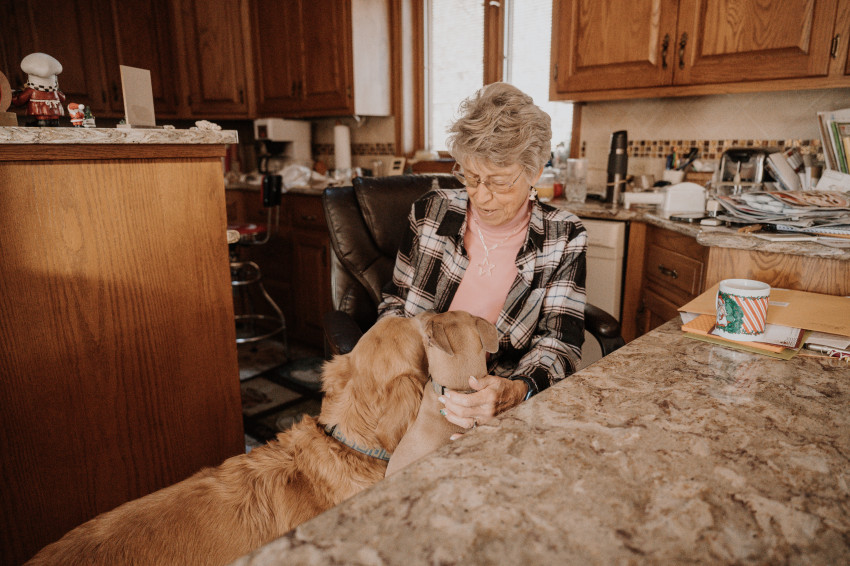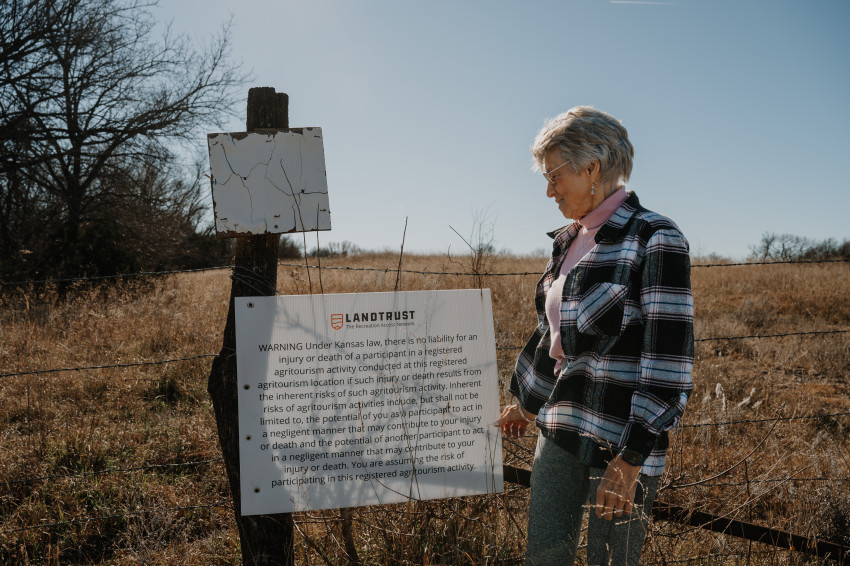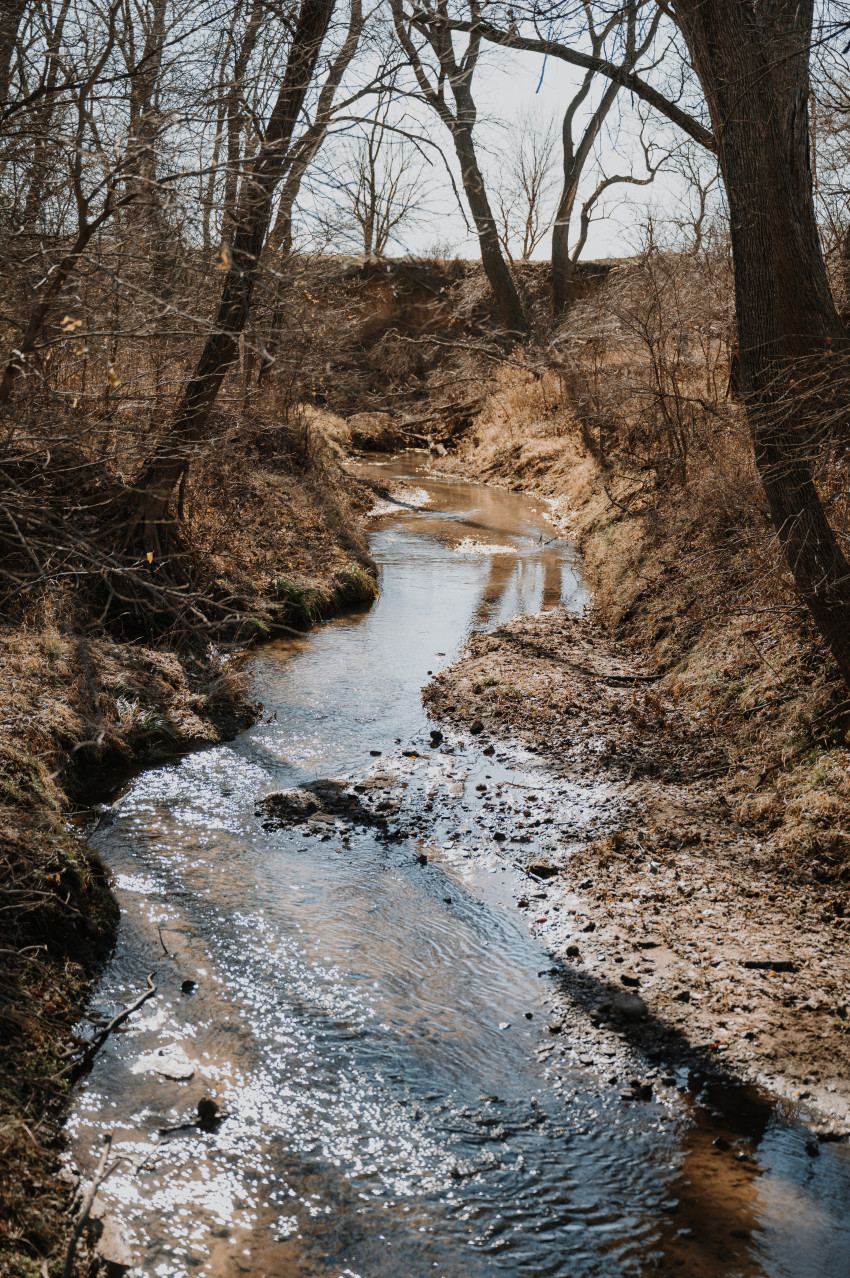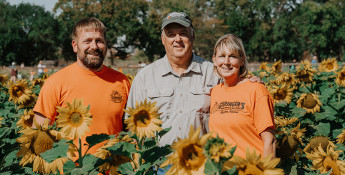By Greg Doering on August 5, 2025
Ottawa County Woman Uses LandTrust to Monetize Her Farm’s Outdoor Access
LandTrust connects landowners, recreationalists
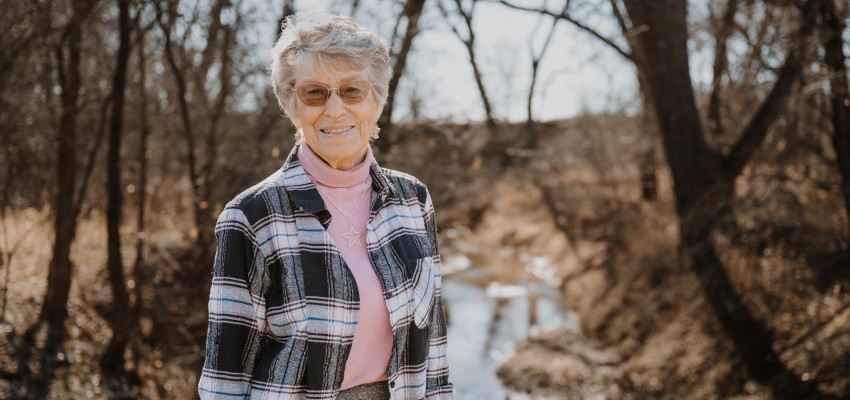
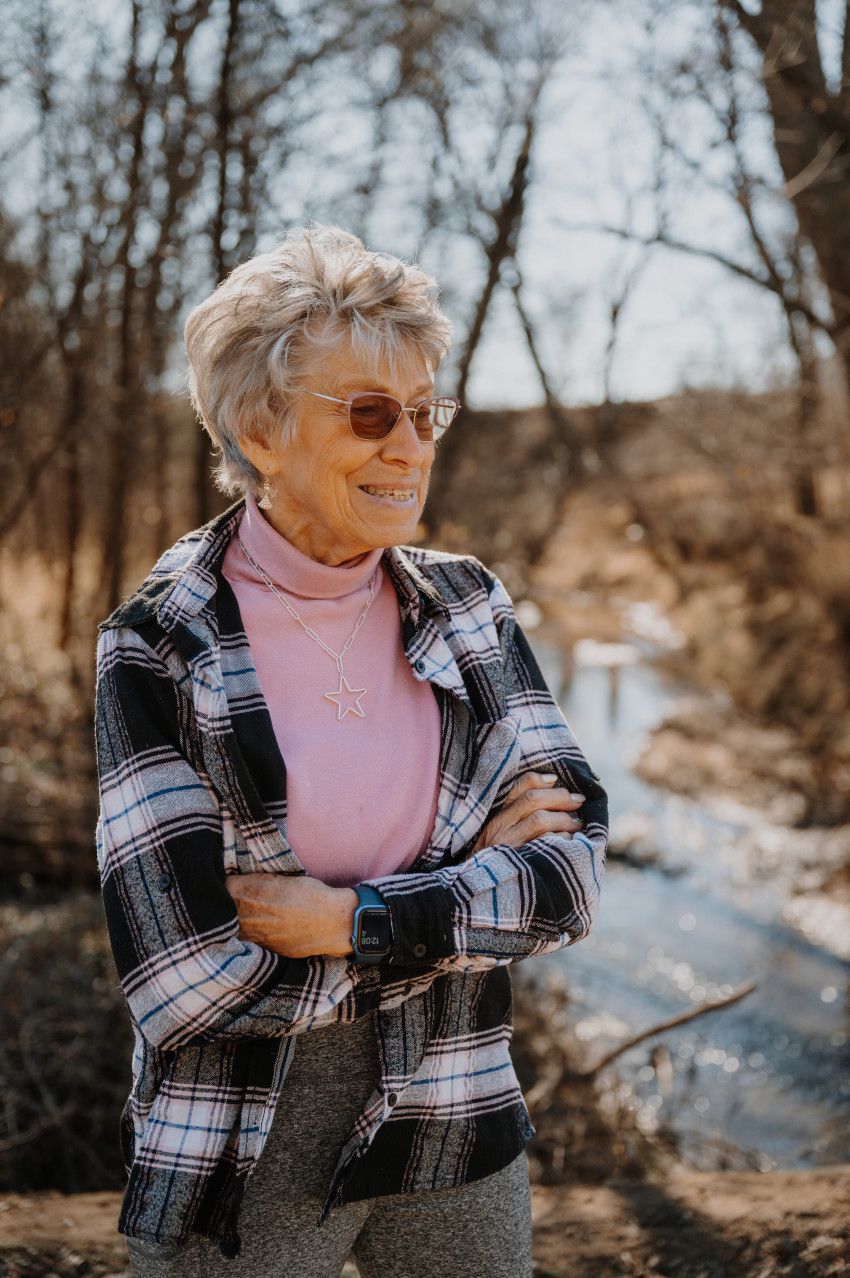 Rosalee Tibbits says she’s “kind of retired,” but the octogenarian doesn’t seem like it when she slyly checks a text message on her smartwatch. A few moments later, she receives a business call. It’s a busy morning at the house Tibbits and her late husband, John, built northeast of Minneapolis in Ottawa County.
Rosalee Tibbits says she’s “kind of retired,” but the octogenarian doesn’t seem like it when she slyly checks a text message on her smartwatch. A few moments later, she receives a business call. It’s a busy morning at the house Tibbits and her late husband, John, built northeast of Minneapolis in Ottawa County.
Tibbits has a menagerie of pets that fill her time, including dogs Ruger and Chloe and cats Max and McDonald who “incite riots” with Ruger. There’s also an albino squirrel that frequents her yard when the riots aren’t raging.
“They fill my time,” she says. “I’ve never been idle, but I’ve never had two dogs before.”
Tibbits also keeps busy running the farm with the help of her son, Tom.
“I’m considered an operator,” Tibbits says. “I do all my own grain marketing and pay my bills.”
Tibbits recently bid on new farm ground, admitting she spent more than she wanted to, “but it wasn’t my first rodeo,” she says.
The purchase is now part of the farm, and it has potential to be rented to hunters looking to bag turkey or deer through LandTrust, an online booking platform that connects landowners and outdoor recreation seekers.
“I found LandTrust online and was interested,” she says. “I perused their site several times. Finally, I said something to Tom, who said, ‘I’ve been following them for a couple months.’”
Tibbits says she called a company representative, and he was at her house the next day to explain the process and how the company protects both landowners and visitors booked through the website.
BEYOND HUNTING
LandTrust’s initial focus when it started in 2019 was connecting landowners with hunters. After the most popular landowners found success through the program, additional outdoor recreation activities were included to enhance revenue opportunities year-round.
“We generally say we’re the Airbnb of outdoor recreation because we encourage landowners to offer more than just hunting and fishing,” says Taylor Moyer, LandTrust landowner marketing and partnerships manager. “On the flip side, hunting and fishing is usually the easiest way to get your first booking.”
Moyer says the platform offers a chance for hunters and other recreationalists to access what are essentially private parks that happen to be managed by farmers and ranchers. That’s especially valuable in a state like Kansas, where 98 percent of the land is privately owned.
“There’s 98 percent of the population that doesn’t get to do and see what agriculturists do every day,” Moyer says. “People want stream access, pond access, just access to hike and be outdoors in an exclusive environment. You’re booking rights to the property for a day within the landowners’ rules.”
TURNKEY TOOL
LandTrust sits in the middle of a two-way market, providing both supply (landowners) and demand (members of the public who want to be outdoors).
“For landowners, we’re a turnkey facilitation tool to be able to add an agritourism revenue stream to your land without adding any overhead,” Moyer says. “A landowner can be as involved or uninvolved as they like LandTrust takes the photos and creates the listing; after that, it’s accepting listings via text message on a cellphone.”
Moyer says landowners who have the most success on the platform are the ones who can provide photos of game animals moving through the property.
“Those photos are worth their weight in gold when it comes to hunting,” he says.
The company operates on a revenue share model, taking 20 percent of any bookings to cover costs of listing properties, insurance and customer service. Farm Bureau members in Kansas receive 85 percent of the revenue from recreation rentals because LandTrust is one of several benefits included in the organization’s annual membership.
In addition to setting the price per trip, landowners can provide instructions to prospective customers on specifics such as gate access or whether they want to meet the renters. And they retain the right to refuse any guest.
One important aspect is, all communication runs through LandTrust to maintain landowner privacy, prevent scammers and preserve documentation in case of a dispute.
“The first thing we do is make sure they’re a real person,” Moyer says of vetting recreationalists, noting that goes a long way toward preventing issues. “People usually don’t mess around if you have their license and credit card on file.”
‘JUST IDIOCY’
Hunters wanting access to Tibbits’ land isn’t new, but previous experiences weren’t always positive.
“Opening day of pheasant hunting was just idiocy,” Tibbits says. “They would come and beat on the side of our house wanting to hunt. They’d plow all over the wheat fields that had just been planted. It was a bad experience to say the least.”
While Tibbits says she’s never gotten over those earlier experiences, she also found success leasing land to individual hunters, most of whom were locals. Those individual deals didn’t cover all of the farm, however, and she viewed LandTrust as a way to make full use of the rest of her land.
“Hunting is very different than it used to be,” she says. “People who hunt have money because it’s costly. They know they have to pay. I thought I might as well be a part of this game.”
LandTrust simplifies the process by vetting hunters, scheduling dates and collecting payments, but the final decision rests with the landowner.
“Right now I have two properties — they can hunt both, but it’s up to me,” Tibbits says of her listings. “I don’t want to spend a lot of time and worry.”
SELLING EXPERIENCE
Tibbits has had a much better experience through LandTrust than with previous generations of hunters pounding on the side of her home.
“I’ve met quite a few neat people through LandTrust,” she says. “There were a couple of guys here earlier this fall, and they were from Maine.”
Hunters are mostly targeting deer and turkeys in the timbered draws on the parcels she has listed near her home.
“Usually, they communicate pretty well,” she says. “The hunter will say, ‘I’ll be there at this time, and I’m driving a white Ford, and I’m from Missouri.’ Sometimes they come and go, and I don’t even know they’ve been here.”
Moyer says Tibbits’ experience is typical for landowners because they can choose what level of involvement they want to have once a property is listed. LandTrust currently offers access to 700-plus properties covering more than 1 million acres across 42 states.
He notes the company remains primarily a facilitator, connecting those seeking outdoor entertainment with hosts who are offering activities, rather than guaranteeing a prize.
“We’re an experience company; we’re not a trophy-hunting service,” Moyer says. “We want people to have great experiences in the outdoors.”
ANOTHER ENTERPRISE
For Tibbits, the hunters who reserve her property through LandTrust are not unlike the corn and soybeans she grows. The recreation market is substantial, and she’s been pleased with the results.
“It is a source of income; it’s another enterprise, and I think it has to be recognized as that,” she says.
The money Tibbits receives supplements the income provided by farming the same ground, but the two revenue streams come at different times of the year.
For most, the recreation payments aren’t game-changing. In 2024, LandTrust helped landowners earn an extra $1 million in total. The average booking is about $800, which adds up with multiple reservations.
“A couple of those pays the taxes,” Moyer says.
Tibbits’ version of being “kind of retired” probably looks different than what other people would consider, but she’ll always be a farmer who’s looking to capitalize on what the land can produce, whether that’s wheat and corn or deer and turkeys.

